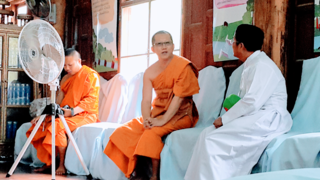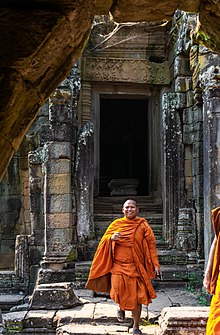Freedom of religion in China may be referring to the following entities separated by the Taiwan Strait:

The majority of Vietnamese do not follow any organized religion, instead participating in one or more practices of folk religions, such as venerating ancestors, or praying to deities, especially during Tết and other festivals. Folk religions were founded on endemic cultural beliefs that were historically affected by Confucianism and Taoism from ancient China, as well as by various strands of Buddhism. These three teachings or tam giáo were later joined by Christianity which has become a significant presence. Vietnam is also home of two indigenous religions: syncretic Caodaism and quasi-Buddhist Hoahaoism.
Buddhism is the state religion of Cambodia. Approximately 97% of Cambodia's population follows Theravada Buddhism, with Islam, Christianity, and tribal animism as well as Baha’i faith making up the bulk of the small remainder. The wat and sangha (monkhood), together with essential Buddhist doctrines such as reincarnation and the accumulation of merit, are at the centre of religious life.
Islam is the official religion in Kuwait, and the majority of the citizen population is Muslim.
The Constitution of Burundi provides for freedom of religion, and the Government generally respects this right in practice. Government policy contributes to the generally free practice of religion. In a 2007 US Government study, there were no reports of societal abuses or discrimination based on religious belief or practice.
Freedom of religion in Comoros is addressed in the constitution which proclaims equality of rights and obligations for everyone.
Nepal is a secular state under the Constitution of Nepal 2015, where "secular" means religious, cultural freedoms, including protection of religion and culture handed down from time immemorial.
Myanmar has been under the rule of repressive authoritarian military regimes since 1962. After the 1974 Socialist constitution was suspended in 1988, constitutional protection of religious freedom has not existed, after the bloody suppression of the 8888 Uprising. The authorities generally permitted most adherents of registered religious groups to worship as they choose; however, the government imposed restrictions on certain religious activities and is accused of abusing the right to freedom of religion.
Freedom of religion in Taiwan is provided for by the Constitution of the Republic of China, which is in force on Taiwan. Taiwan's government generally respects freedom of religion in practice, with policies which contribute to the generally free practice of religion.
The Constitution of Laos provides for freedom of religion; however, the Government restricted this right in practice. Some government officials committed abuses of citizens' religious freedom.
The Constitution of Mongolia provides for freedom of religion; however, the law somewhat limits proselytism.

According to the 2018 census, Buddhism is the largest religion in Thailand, practiced by over 94% of the population; Islam makes up 5% of the population. The Thai government officially recognizes five religions: Buddhism, Islam, Hinduism, Sikhism, and Christianity.
The Constitution of Kuwait provides for religious freedom. The constitution of Kuwait provides for absolute freedom of belief and for freedom of religious practice. The constitution stated that Islam is the state religion and that Sharia is a source of legislation. In general, citizens were open and tolerant of other religious groups. Regional events contributed to increased sectarian tensions between Sunnis and Shia.
The Basic Law, in accordance with tradition, declares that Islam is the state religion and that Shari'a is the source of legislation. It also prohibits discrimination based on religion and provides for the freedom to practice religious rites as long as doing so does not disrupt public order. The government generally respected this right, but within defined parameters that placed limitations on the right in practice. While the government continued to protect the free practice of religion in general, it formalized previously unwritten prohibitions on religious gatherings in locations other than government-approved houses of worship, and on non-Islamic institutions issuing publications within their communities, without prior approval from the Ministry of Endowments and Religious Affairs (MERA). There were no reports of societal abuses or discrimination based on religious belief or practice.
In Qatar, the Constitution, as well as certain laws, provide for freedom of association, public assembly, and worship in accordance with the requirements of public order and morality. Notwithstanding this, the law prohibits proselytizing by non-Muslims and places some restrictions on public worship. Islam is the state religion.
The Constitution of Yemen provides for freedom of religion, and the Government generally respected this right in practice; however, there were some restrictions. The Constitution declares that Islam is the state religion, and that Shari'a is the source of all legislation. Government policy continued to contribute to the generally free practice of religion; however, there were some restrictions. Muslims and followers of religious groups other than Islam are free to worship according to their beliefs, but the Government prohibits conversion from Islam and the proselytization of Muslims. Although relations among religious groups continued to contribute to religious freedom, there were some reports of societal abuses and discrimination based on religious belief or practice. There were isolated attacks on Jews and some prominent Zaydi Muslims felt targeted by government entities for their religious affiliation. Government military reengagement in the Saada governorate caused political, tribal, and religious tensions to reemerge in January 2007, following the third military clash with rebels associated with the al-Houthi family, who adhere to the Zaydi school of Shi'a Islam.
The Constitution of the Republic of Cyprus provides for freedom of religion. The government of the Republic of Cyprus is the only internationally recognized government on the island, and administers two-thirds of the island.
The Constitution of Panama provides for freedom of religion.
The status of religious freedom in Africa varies from country to country. States can differ based on whether or not they guarantee equal treatment under law for followers of different religions, whether they establish a state religion, the extent to which religious organizations operating within the country are policed, and the extent to which religious law is used as a basis for the country's legal code.
The status of religious freedom in Asia varies from country to country. States can differ based on whether or not they guarantee equal treatment under law for followers of different religions, whether they establish a state religion, the extent to which religious organizations operating within the country are policed, and the extent to which religious law is used as a basis for the country's legal code.


